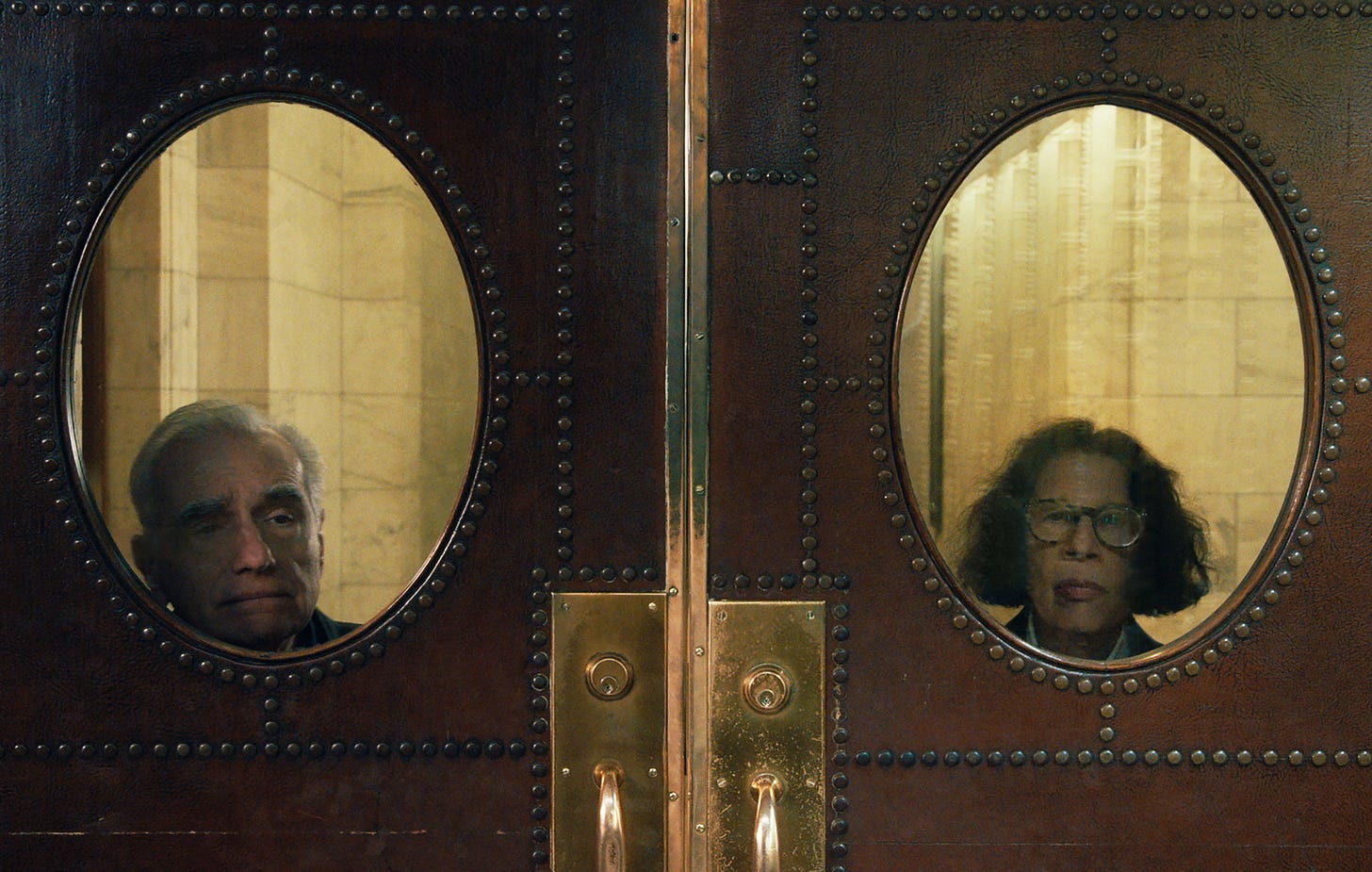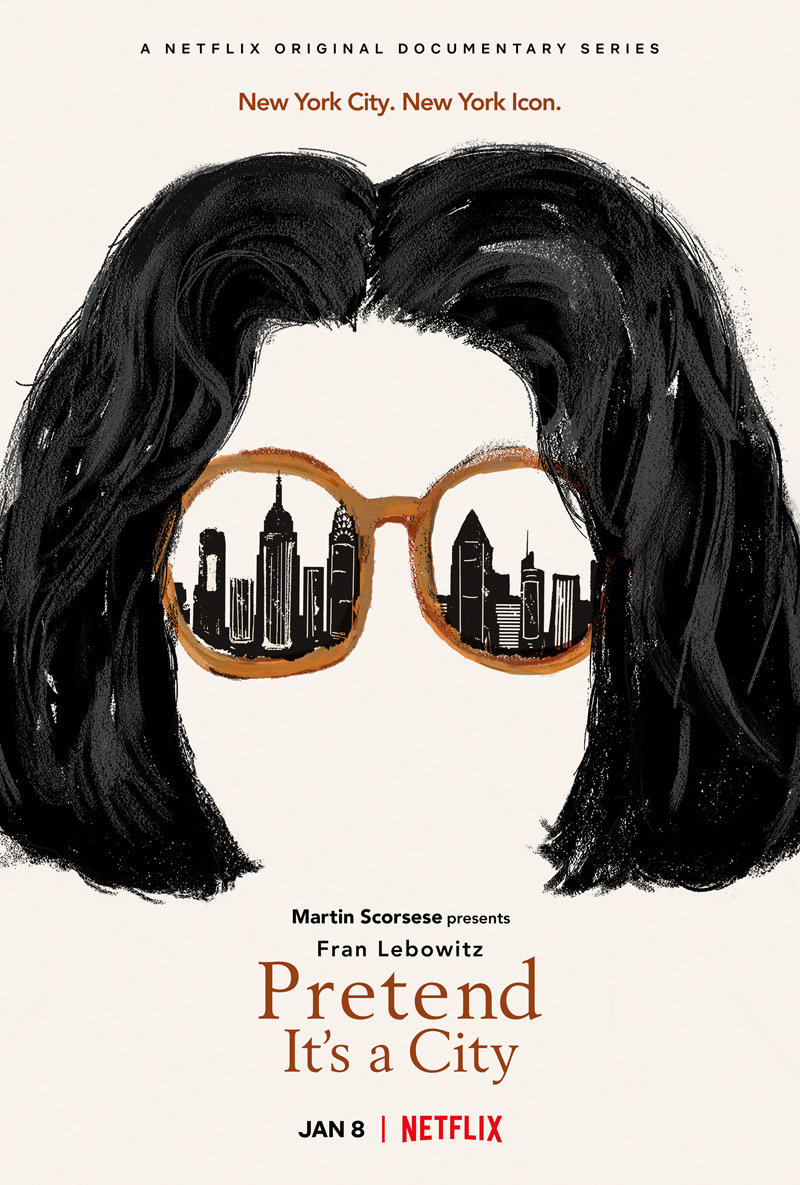Pretend It’s A City (2021)
Fran Lebowitz teams up with Martin Scorsese, once again, in an enjoyable limited series for Netflix.
Pretend It’s A City reunites the acerbic New York writer and humourist Fran Lebowitz with Public Speaking (2010) collaborator Martin Scorsese in a witty seven-part limited series for Netflix.
One could rename the series to Public Speaking: An Unabridged Redux. At 84 minutes, Public Speaking, a documentary of sorts, introduced many to Lebowitz in a round-about fashion. Fans of the documentary were always left wanting more. Thanks to the binge-viewing era, a streaming service feels like the perfect home for this expanded look at the life and viewpoints of Lebowitz.
Picking up where we left off, Scorsese and cinematographer Ellen Kuras shoot Lebowitz walking the streets of Manhattan, in her typical white shirt and dark blazer, judging each person she encounters who gets in her way or does something to annoy.
Cut to the Queens Museum of Art and we find Lebowitz walking around Robert Moses’ incredible Panorama of the City of New York miniature model, built for the 1964 World’s Fair. Lebowitz stands within the model, in perfect symbolism, cast as God, holier than thou. Or as Scorsese jokes, Godzilla the destroyer.
Pretend It’s A City captures a series of conversations between Lebowitz and Scorsese (and other moderators) in several Manhattan landmarks, including the New York Public Library, Grand Central Station and the National Arts Club in Grammercy Park. There is little attempt to introduce Lebowitz to the limited series’ audience, assuming prior knowledge or an ability to Google.
Each episode covers a different topic, including New York, culture, travel, money, sports and wellness, aging, and books. Scorsese frames Lebowitz’s thoughts in a non-linear order, rather than starting from her youth. This effect mimics the way we encounter people in real life, learning stories triggered from random topics, rather than hearing chronological instalments of their life, starting at childhood.
And it’s Lebowitz’s life that is the focus. Though the series documents discussions between Lebowitz and Scorsese, Spike Lee, Alec Baldwin, Olivia Wilde and archival interview footage with interviewers like David Letterman, it’s Lebowitz who remains in focus. Anyone else acts as a conduit to the talent.
Merciful editor David Tedeschi and Scorsese have curated these exchanges into bite-sized half-hour episodes, giving us enough time to come up for air and breathe before the next episode. Moments to digest are needed given the dense nature of the episodes that are full of incredible insights and biting one-liners.
Pretend It’s A City functions in a similar format to the confessional Agony Aunts/Agony Uncles (ABC, 2012-15) and the commentary of Grumpy Old Men/Grumpy Old Women (BBC Two, 2003-07) series. Curmudgeonly complaints on modern life fill the time, except in the case of all three series, these complaints are humourous insights from smart people who have lived an interesting life. Lebowitz’s best quick quips come in the form of ‘Anger comes from having no power’ to ‘if you can eat it, it’s not art’ and ‘we live in a world where people applaud the price and not the art’.
Further interspersed archival footage of New York, as well as film clips, highlight Lebowitz’s claims and complaints, most enjoyably with a clip from Scorsese’s After Hours (1985), where Griffin Dunne is driven comically around by a maniac taxi driver, furthering Lebowitz’s point about the insane driving of New York taxi drivers.
These clips – as well as the series itself and countless other series, films, and documentaries – define a collective version of New York to those who don’t live there. Books are published with guides and maps to the places you’ve seen on screen and where to find them, along with tidbit trivia. While it’s clear Lebowitz hates the tourists that would buy these books, it’s easy for an audience, no matter the city they come from, to sympathise with her plight about our fellow humans and their shortcomings.
Lebowitz notes people have too much self-esteem these days, resulting in a mire of average books published. As I write this, I fear the barbed stings that would come from Lebowitz if she were to read my inadequate response to Pretend It’s A City. Luckily, Lebowitz does not own a mobile phone, computer or even a typewriter, so the likelihood of this occurring is low.
Pretend It’s A City details Fran Lebowitz’s legendary wit and serves as a document of her legacy, as well as the legacy of a foregone New York City. Shot pre-pandemic, Ellen Kuras’ cinematography showcases the concrete jungle that is Manhattan and warmly invites us into the National Arts Club table with Scorsese and Lebowitz.
Randall Poster’s role as music supervisor adds a sophisticated layer onto an already sophisticated palette. Poster’s choices are crucial in marking Lebowitz’s bold statements with bold music, ranging from Alfred Newman’s loud and bombastic “Prelude” from The Robe (1953) to Ray Charles confidently singing “New York’s My Home” and noting “when you leave New York, let me say, you ain't going nowhere”.
Strangely, three-and-a-half hours does not seem to do Lebowitz justice. That said, these seven episodes are a great way to spend time with the sardonic mind of Fran Lebowitz. More topics could be covered without strain for those involved or the audience. If sour, angry and annoyed New Yorker’s complaints work for you, then this enjoyable limited series will be a treat best served cold.
Pretend It’s A City is streaming on Netflix.
Whole series screened for review.
Never miss an update
Subscribe to 52 Seasons now and you won’t have to worry about missing anything.
Every new post will go directly into your inbox and you can easily unsubscribe at any time (I promise I won’t mind).





